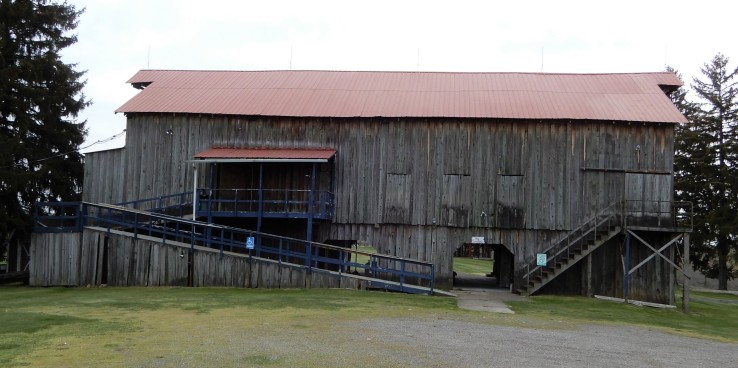
It’s 2021, and the Brooke Hills Playhouse is celebrating the opening of its 50th season. As one of the initial investors, it seemed appropriate for me to look back over the decades of plays and musicals produced on the Playhouse stage. This then is the story of how a pre-Civil War apple barn in Brooke Hills Park outside of Wellsburg, West Virginia became a little theatre. However, writing a memoir means waking up in the middle of the night to make a note about something that happened long ago and now has crept back into your consciousness. It also means answering a lot of questions, such as, “How did that come about?” or “What were we thinking?” or “Why did we do it that way?”
After writing for a couple of weeks, I wondered, “How did this all begin?” Even when I was putting on talent shows with the neighborhood kids in our garage, I never thought about putting on plays or running a theatre.
Eventually, it came to me. This Prologue isn’t about Brooke Hills Playhouse and can easily be skipped. It’s how my life was re-routed and set on a grand adventure full of love, laughter, amazing and talented people, an old barn, and a goodly amount of beer!
So, this prologue is about those who influenced me and my great friend Norma and how I/we got hooked on drama. Wait for the next installment if you’d rather read about how the Playhouse actually began.
HOW TEACHERS AND CHANCE ENCOUNTERS CHANGE LIVES
In the fall of 1965, I matriculated for my freshman year at West Virginia Wesleyan College. My dad wanted me to go to West Liberty State College (now West Liberty University), his alma mater and just 12 miles from my home in Wellsburg, West Virginia. I think that I thought I was too cool, ha-ha, to follow in his footsteps.
Some of my friends were going to West Virginia University, but the size of that place scared me. Snob that I was, I just had to go to a private school, and Wesleyan offered me a scholarship, a loan, and some work-study jobs. (N.B. I was a chapel-checker for the mandatory Tuesday chapel services or lectures for $25 a SEMESTER! I cleaned 600 pounds of chicken, relieving them of their pin feathers and fat every other Saturday morning for $1.25 an hour. It took about 5 hours, so that was a whopping $6.25 for that day, $12.50 a MONTH! And during the second semester, I picked up some spare change by occasionally serving a banquet which probably netted me $3.00 per evening and a sore back and knees from carrying huge trays with 8 plates of food on each tray. Work study wasn’t exactly a cash cow.)
From a financial standpoint, my insistence on going to Wesleyan was one of the dumber things I’ve ever done (but I will forever cherish the friends I made that year). Although I am a life-long Methodist, Wesleyan and I just weren’t a fit. The rules were so confining, and I was looking for freedom now that I was finally away from home. As freshmen, we had to be in our dorms by 9:30 p.m. and in our rooms by 10:00 p.m. It was a little later on weekends, but it was so strict, stricter than my mother! Of course, I got caught breaking those curfews and a few other rules, and by the end of the year, I was looking at a lifetime on social probation.

I returned home to Wellsburg, W.Va. during spring break and learned that my good friend from high school, Norma Stone (who wisely attended West Liberty), had worked on a play about to open in the college’s old theatre. The play was Mr. Roberts, and Norma’s speech teacher had asked her to help get the show up and running by working on costumes and props. She was happy to help, and since I was in town, Norma asked me if I wanted to go and see the show she’d worked on. I did. It was a great production. A guy named John Hennen played the lead. Another guy named Bill Harper had built the set and procured the goat!
I went back to Wesleyan and finished my freshman year. Because I hated the thought of leaving my Wesleyan friends, I made the decision to transfer to West Liberty pretty late. “At least,” I told myself, “I have some Wellsburg friends going to West Liberty already.” I was unable to get a dorm room, so I became a commuter–without a car. Fortunately, I was able to pay another commuter with a similar schedule for a daily ride. The real problem regarding the transfer was that transfer students registered for classes last.
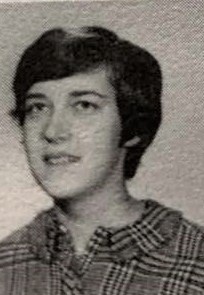
In those days, registering was a crazy, mad dash. Rooms in Main Hall were designated for various departments. Professors sat behind tables with stacks of computer punch cards. Students, clutching their desirable, hand-made, tentative schedule, would go from professor to professor trying to get punch cards for the classes that fit into their schedule. They made schedule changes on the fly as classes closed. Punch cards were returned, and new cards were picked up. I’m telling you it was nuts, but the worst part was that rising seniors registered first, followed by juniors, and so on down the line. Transfers registered last and were lucky to get any classes they wanted or needed. By the time I was eligible to register, a lot of the classes were filled, and a lot of professors had gone home!
So, there I was trying to find 6 three-hour classes that didn’t conflict with one another or with my ride’s schedule. I hadn’t declared a major, so I didn’t care what my classes were, as long as they counted toward graduation. I was able to get cards for art appreciation, algebra, world history, and English literature, and then I was stuck, needing two more classes. I know I looked desperate and ready to cry when this nice guy, some teacher, came to my rescue. He was able to look over my schedule and see possibilities.

First, he got me into a general psychology class, and then he marched me over to a table where all but one professor in this department had gone home. This last guy was packing up, but my savior, in the most well-articulated, deliberate voice ever, said, “Stanley, this girl needs one more class. I’d like you to take her in your Monday, Wednesday, Friday 9:00 a.m. Speech 101 class.”
“Mike,” this guy Stanley said, “I’m full, and I’m finished.” (Meaning his classes were full, not that he was full from eating lunch!)
My new best friend and savior, the Mike guy, in a voice that was even more deliberate, said, “Stanley, your class meets in the theatre, and you can fit her in.”
Stanley gave us both a shriveling look, but he reached down into his brief case, pulled out a card, and practically threw it at me. Then he tossed a writing pad on the table for me to sign my name to his class list.
I thanked the Stanley guy, but I don’t think he cared. Mike and I walked out of the room while I thanked him profusely. No two classes on my schedule went together, but I didn’t care. I had a full schedule for my $105 semester tuition!
A few days later, I saw Mike again, in the hall outside the theatre, where I’d just experienced my first class with Stanley, now Mr. Harrison to me. I pointed toward Mike, and said to another student, “That’s a really nice guy.”
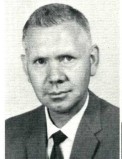
My fellow student said, “Oh, yeah. He is. He’s Mr. Reimer. He’s the head of the Speech and Drama Department.”
“Well, you’d never know it,” I said. “He really helped me at registration.”
The semester progressed, and one day Mr. Harrison stopped me after class. “Murphy,” he said, very gruffly, “I don’t give “A’s” in Speech 101.”
“Oh,” I said, obviously surprised. “I’ve gotten “A’s” on all of my speeches, haven’t I?”
“Yes, you have, but I don’t give “A’s,” he repeated.
What was I to do? He obviously was still pissed that Mr. Reimer had made him take me into his class. “Okay,” I said, and that was that.
My class was in the theatre which turned out to be a brand-new facility. About mid-way through the first semester, the theatre had its official opening. One of the other professors in the Speech and Drama Department was Dr. Helen Kelly. Dr. Kelly and Mr. Harrison had decided to open the theatre with a production of Shakespeare’s Twelfth Night.
Twelfth Night was chosen because Mr. Harrison had done his thesis for his M.F.A. at Yale on the character of Malvolio in Twelfth Night, and Dr. Kelly had done her dissertation for her Ph.D. from Michigan on five shows directed by Harley Granville Barker, one of which was Twelfth Night. In her dissertation, she had quoted from the thesis of one Eugene S. Harrison from Yale. Ironically, the two had ended up teaching together at a small college in the boondocks of West Virginia’s Northern Panhandle.
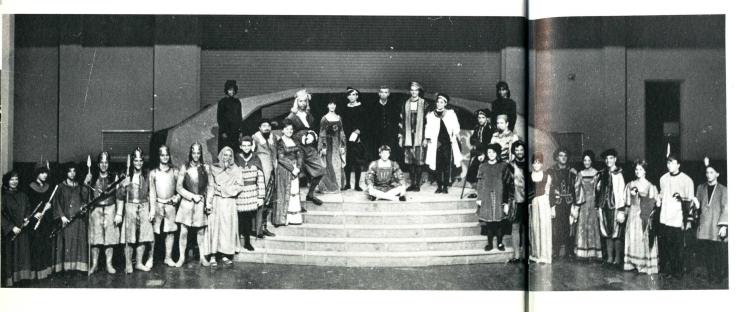
Norma worked backstage on Twelfth Night. She vividly remembers that one night, the guy playing Sir Toby Belch got too close to a candle, and a big plume on his hat caught on fire! One of the actors made a quick cross, grabbed the feather, threw it to the ground, and stomped out the flame, much to the delight of the audience and perhaps to the horror of the actor playing Sir Toby!
I went to see the show (unfortunately not on the night of the flaming plumage) which was outstanding and memorable to this day, 55 years later! Dr. Kelly directed the show, and Mr. Harrison, his bandy legs in banana yellow tights with black ribbon crossed garters, played Malvolio. The audience was enraptured and raucously entertained. What theatre had ever had such a wonderful christening?
Later, near the end of the semester and as my fellow speech students were shuffling out of the theatre after class one day, Mr. Harrison stopped at the door, turned back and said, “Murphy, see me in my office!”

“Oh, okay. Now?” I asked.
“Yes, now,” was the gruff reply. This Stanley Harrison-guy had me shaking in my shoes, even after a whole semester in his very enjoyable speech class.
I let him go ahead and then followed a few minutes later up the steps that led to his small office. Behind his desk was a big window overlooking the audience and stage of the new theatre. He sat at his desk, head down, making notes on something. I think I finally cleared my throat to announce my presence, or maybe not. I probably just stood there waiting for him to say something.
Eventually, he looked up and said, “Murphy, did you ever think about being a speech major?”
I was a little shocked and eventually said a soft and tentative voice, “No.”
“Well,” he said, “think about it. That’s all.”
And I turned around and left. For the rest of the day and over the weekend, I thought about what Mr. Harrison had said.
I had been the very worst public speaker in my high school speech class at the beginning of the semester. Norma will gladly attest that each time I spoke my knees would visibly shake, my voice would continually crack, my knuckles would turn white from the death grip I had on the podium, and a redness that started on my chest would progress up my neck and eventually turn my entire face red! By the end of that semester, however, I tried out for and became one of the four graduation speakers. High school speech class started a process that would influence the rest of my life.
Now, here was my college speech teacher, asking me to consider being a speech major. No one else, except for my mother who insisted that I be a teacher of some sort, had ever counseled me on the direction of my future. Not that Mr. Harrison’s question, “Murphy, did you ever think about being a speech major?” was all that inspiring, but he had taken the time to ask it. I thought, “What the heck? I’ll be a speech and drama major–at least for long enough to check in out.”
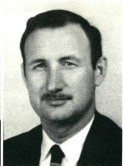
The following semester I enrolled in Play Direction I, which I really didn’t like that much, and Technical Theatre, wherein we learned to build and paint scenery, focus lighting instruments, and build a few props. Costumes and make-up would come later. If Mr. Harrison had changed the direction of my future, Mr. Bob Alexander, the tech theatre prof, ensured that I would love putting on plays for the rest of my life. Little did I know how often I would use Tech Theatre and Play Direction I in later years.
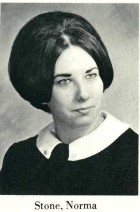
Norma and I would combine our talents, working on a number of shows together during our remaining years at West Liberty, happy as clams to be doing something we both loved, something we would continue to do together at Newport High School where we both taught in Kentucky, at Brooke Hills Playhouse, and Brooke High School, where we also taught together. In truth, Stanley had impacted our entire lives and, it turns out, the lives of numerous others.
And so, transferring to West Liberty was one of the best decisions I have ever made. The following semester, that is the first semester of my junior year, I was hired to work in the West Liberty theatre for pay! I loved it so much, I would have done it for nothing.
At the end of my junior year, Mr. Harrison, now Stanley, called me into his office for a third time. This time he asked if I would be interested in working for the summer at the White Barn Theatre, a summer stock theatre, in Irwin, Pennsylvania, about 30 miles east of Pittsburgh. John Hennen (of Mr. Roberts’ fame) and a guy in the theatre department named Bill Nelson (Nelly) had worked there in previous summers. I would be working at the White Barn alongside Bill Harper (Mr. Roberts’ set builder).
At the White Barn we worked for Tommie (actually Joanne) and Al Martin, who would later help us launch Brooke Hills Playhouse. Bill, John, Nelly, and I all had great experiences at the White Barn, kindling our mutual love for summer stock theater.

By the time I graduated from West Liberty in the spring of 1969, my college theatre earnings had enabled me to pay off my loan from Wesleyan and my sorority dues at West Liberty. AND my life had changed–dramatically–something that never would have happened at Wesleyan which didn’t have a Speech and Drama Department! Brooke Hills Playhouse was still a few years down the road, but the cast was waiting in the wings.
It’s amazing how one seemingly small decision builds on other small decisions that together give a person the building blocks the determine the course of her life! So it is with you, Shari. I look forward to reading the next installment!
LikeLike
I am enjoying every word of this history and “The Playhouse in the making”. I can’t help think about
“ The Walrus “ and our own Charlie Calabrese. (I think that’s where you’re going with this, but we will see…)
Keep writing but how do you remember all of this ???
I just want you to know The Playhouse created the best childhood memories that I will always carry with me.
LikeLike